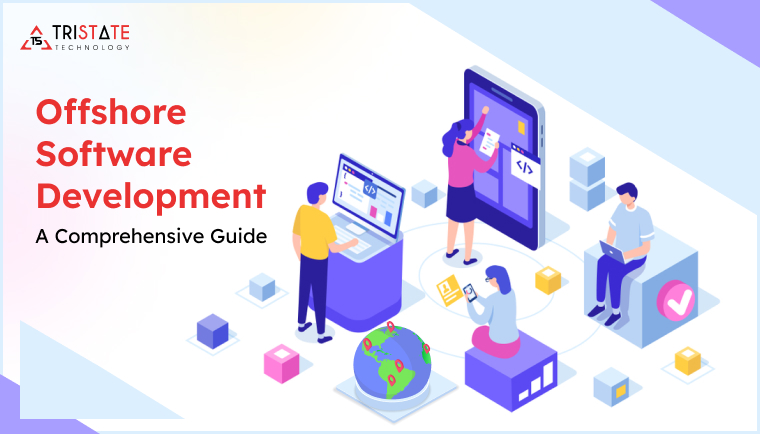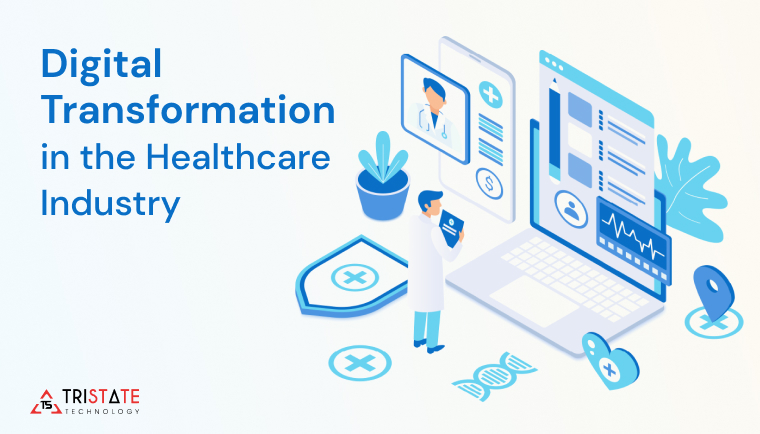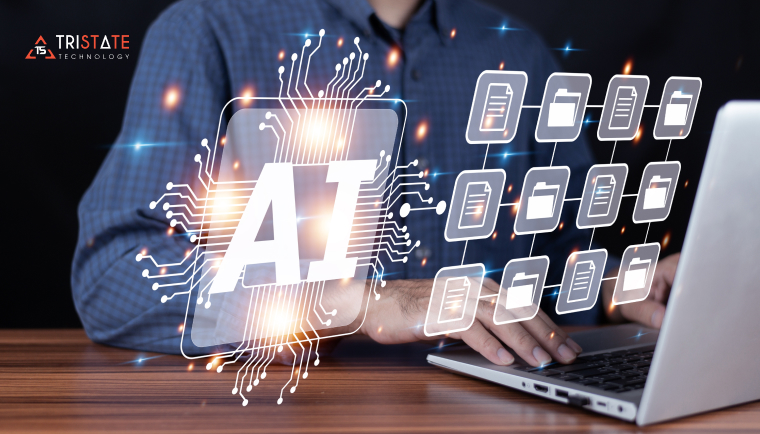
Nowadays, businesses are growing at a rapid pace by using advanced machine learning and Artificial intelligence. From securing your information to data automation, artificial intelligence solutionsare being used in every step of business operations. These days, companies are trying to turn their business digitally with the help of ML and AI.
Every organization is looking to grow and reach the bigger ground of success, and that’s the reason why they hire AI and Machine Learning expertsto reshape their business. AI and ML technologies help organizations reduce human effort, minimize investment costs, foster productivity, and generate the highest revenues. There are lots of things that AI and ML can bring to your business.
In this blog, we have mentioned the role of AI ML development services, their future trends, the benefits of integrating, and additional ideas in depth.
Role of AI & ML in Transforming your Business
AI is utilized for developing software & systems to perform tasks that require human intelligence. Businesses use AI for problem-solving, reasoning, identifying patterns, understanding natural languages, etc. These systems stimulate and automate complex processes & cognitive functions. It has the capability to work with complex datasets and extract them to get valuable insights.
By integrating AI into business operations, organizations can predict future outcomes, identify trends, and build data-driven decisions.
On the other side, Machine Learning Development is the subset of AI that helps in developing algorithms & statistical models. Machine learning analyzes huge data sets, gathers valuable data, and adapts the algorithms for building informed decisions and predicting situations.
Based on the reports of Statista, the estimated market of AI in 2021 was 15.84 billion U.S. dollars, and the future trends in AI and ML integration are anticipated to grow to 107.5 billion by the year 2028.
The worldwide market research reports for Machine learning reached a value of $19.20 billion by 2022 & the market is anticipated to grow to an impressive value of $225.91billion by 2030 with a CAGR of 36.2%.
The impact of machine learning on business successis significant, and both play transformative roles in various aspects.
How do ML and AI help businesses smoothen their business operations?
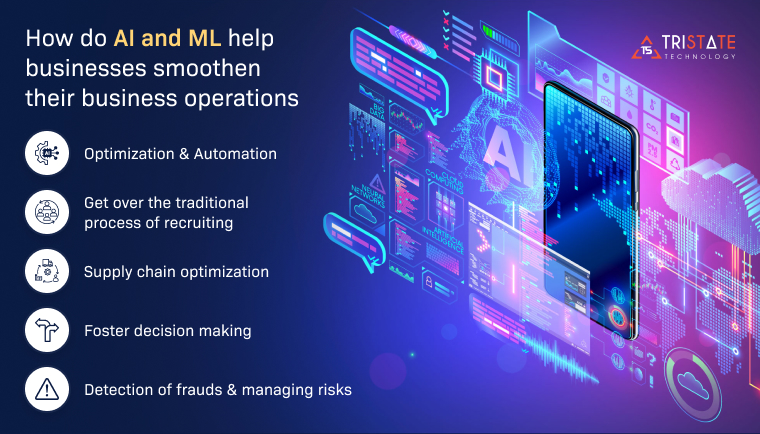
1. Optimization & Automation
Businesses use AI and ML to identify repetitive, labor-intensive tasks in a quick manner. AI and ML help businesses to automate & simplify the process. AI is used for handling business tasks like analyzing documents, data entry, screening and processing, customer inquiries, etc.
AI and ML are used to design a huge volume of data efficiently. They are used for processing the structured and unstructured information gathered from huge resources such as documents, websites, the internet, email, etc. It helps to validate the data, categorize the expenses, process invoices, and make valuable decisions.
2. Get over the traditional process of recruiting
With the help of ML & AI algorithms, recruiters can easily automate the process of onboarding and hiring employee processes. The AI & ML algorithms help in screening & analyzing the resumes of candidates & receiving applications for the job role. It compares the resume and chooses the candidates based on their qualifications, skills, and experience level.
This procedure helps to save time for the human recruiters and reduce the chances of repetitive tasks by ensuring effective and accurate candidate screening. The AI-powered chatbots help recruiters schedule and handle candidate inquiries, providing data about the opening job positions.
It also helps businesses to guide the candidates throughout the application procedure, enhance the overall experience of candidates, and minimize the burden of HR.
3. Supply chain optimization
Organizations integrate AI and ML to study past information and analyze market trends to measure the future demand for targeted services. The following predictions help to manage the inventory & eliminate the overstocking & understocking risks. Overall, we can say that AI automatically adjusts the level of inventory based on real-time demands and other variables.
Through AI, businesses can protect themselves from overspending and enhance their cash flow. The algorithms of ML identify the effective logistics and transportation routes. It monitors multiple aspects like traffic conditions and weather forecasts and selects the best routes. It eliminates the cost and time of delivery but level up the expectations.
4. Foster decision making
Organizations that process steps to integrate AI and Machine Learningcan collect information from multiple sources like the internet, databases, IoT devices, and external data sets. It cleans, consoles, and transforms data to build real-time predictions. It also helps to monitor the data and present recommendations to vendors and users.
5. Detection of frauds & managing risks
When a business integrates AI, it can easily detect and stop fraudulent activities. It helps to manage the risks efficiently and deliver the best benefits for industries like insurance, e-commerce, insurance, cybersecurity, and finance.
Businesses can integrate AI to recover fraud cases, user activity logs, and transaction records. ML also helps share recent market conditions to predict risks. It ensures the business meets with the industry regulation compliance, stimulates the risks, and helps the organization to understand the different risks on their financial & business operations.
Benefits of implementing ML and AI in business process management
A successful integration of AI and ML in business process management helps businesses gain competitive benefits over their competitors. Here are the benefits of AI and ML integrationyou can achieve-
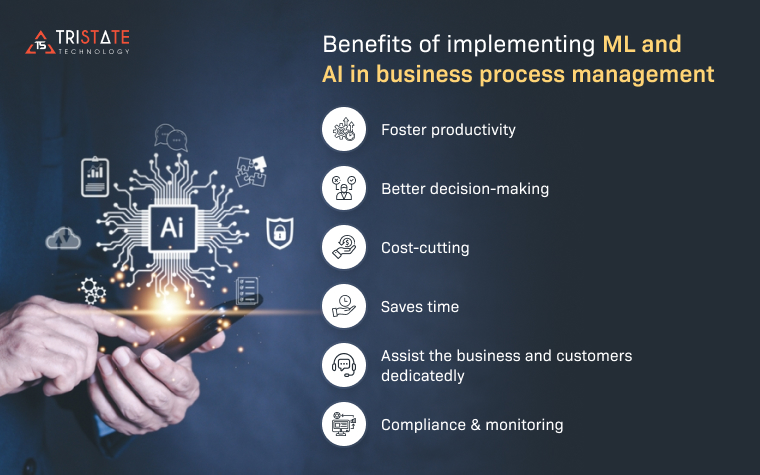
1. Foster productivity
Integrating ML and AI helps businesses optimize and improve efficiency and eliminate the chances of human errors and repetitive tasks without any manual interventions.
2. Better decision-making
ML helps to gather valuable insights from large amounts of information to support data-driven decision-making. It assists organizations & developers in the allotment of resources and strategic planning.
3. Cost-cutting
Using AI in business process optimization eliminates operational costs and maximizes the utilization of resources. It helps to acknowledge the cost-saving opportunities & finish multiple tasks with minimal tools.
4. Saves time
Organizations can foster their work automation by integrating ML and AI into business processes. It quickly assists the customers and resolves their queries.
5. Assist the business and customers dedicatedly
Virtual assistants and AI-powered chatbots help users 24/7. It offers dedicated support to resolve the issues that concern you. It not only helps to offer solutions but also enhances customer engagement.
6. Compliance & monitoring
Utilizing AI in the business process optimization business can automate repetitive tasks based on reporting, auditing, and data security. It helps organizations to monitor and ensure compliance with other industry regulations and keep the data secure.
Ready to revolutionize your industry with AI ML solutions? Contact us for expert guidance!
Contact us to Get Started!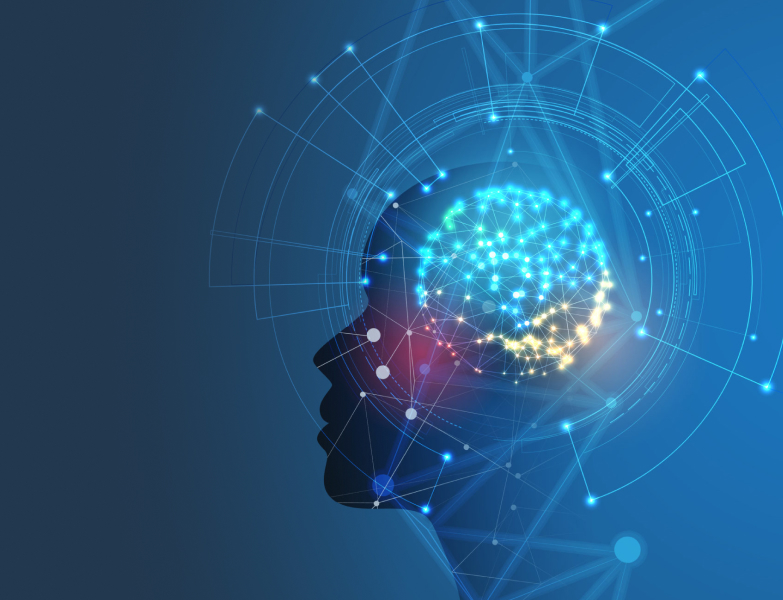
AI and ML’s Future in Business
The following are some growing future business operations with AI and MLthat are influencing the corporate environment and market dynamics:
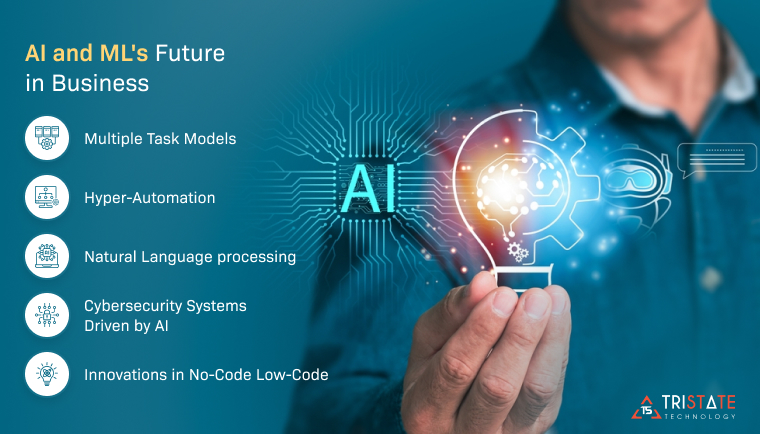
1. Multiple Task Models
Advanced machine learning and artificial intelligence models known as “multi-task models” are able to manage and carry out several tasks or goals at once on a single system. These models require fewer resources and instruction since they are able to learn and generalize several tasks simultaneously. Time and effort are saved since the system does away with the requirement for distinct, task-specific models.
By utilizing common data across several jobs, they also decrease redundancy and increase data usage. Put another way, the information acquired to complete one activity can aid in the completion of subsequent activities. Furthermore, these models may be adjusted and tailored to meet the needs of companies and sectors.
2. Hyper-Automation
A cutting-edge strategy for streamlining company operations through the integration of AI and ML is called hyper-automation. It makes use of both technologies to optimize, automate, and simplify a variety of internal procedures.
Compared to previous algorithms, these new ones are far smarter. They automate complicated jobs and carry them out more quickly and accurately by using trained robotics and automatically created learned algorithms. According to the study, 30% less money may be spent on operations thanks to the improved algorithms & excessive automation techniques of AI and ML.
3. Natural Language processing
A branch of machine learning and AI called natural language processing (NLP) makes links and makes it easier for computers and human language to communicate. It gives computers the ability to understand, interpret, and produce meaningful, contextually appropriate human language.
AI chatbots & virtual assistants that respond to consumer questions and handle problems are powered by natural language processing (NLP). It operates around the clock and offers the best customer service. Additionally, from unprocessed text data, such as emails, gathered data, customer reviews, social media chats, etc., NLP automatically pulls trustworthy information and valuable data insights.
4. Cybersecurity Systems Driven by AI
These are sophisticated security technologies that provide strict and cutting-edge security for AI integration into company operations. They defend networks, computer systems, and private information against online dangers and intrusions. They use algorithms to track, recognize, and instantly address security issues.
Additionally, it lessens unnecessary security warnings and false alarms, saving time and allowing personnel to concentrate on real issues.
5. Innovations in No-Code Low-Code
With the use of pre-built components and visual interfaces, developers with little or no programming knowledge may create apps and automate tasks with low-code and no-code platforms. Without depending on IT departments, industries, companies, or people can build apps using these platforms.
These developers’ ability to automate intricate operations is further enhanced by the use of AI in corporate processes. Moreover, it may streamline and automate complex operations, promoting creativity, accelerating job completion, and optimizing resource use.
Looking to stay ahead of the curve with AI and ML? Contact us for expert development solutions
Let’s connect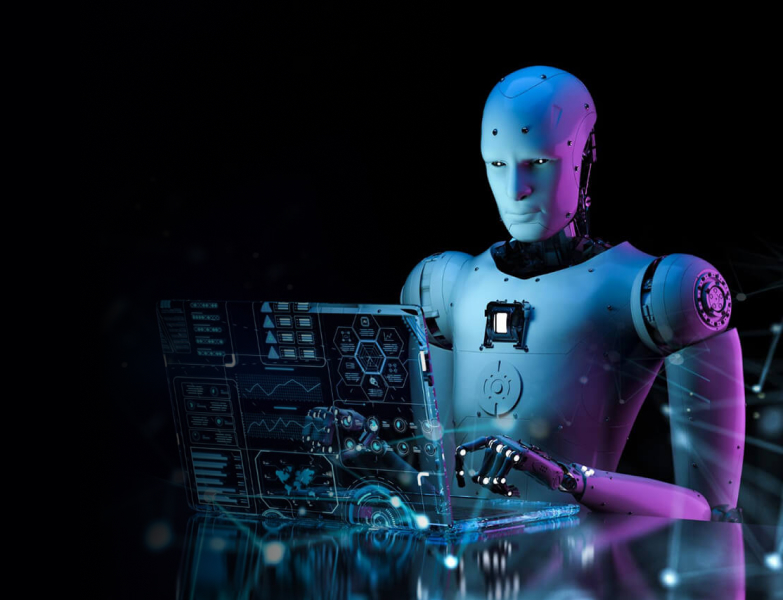
Summary
There is no denying that the market environment is changing significantly as a result of the incorporation of Solutions for AI integration challenges& ML into business processes. Workflows are evolving from being manual and rule-based to becoming data-driven, predictive, and effective. There are several Challenges in AI and ML integration, ranging from data quality issues to ethical problems. To guarantee that AI and ML are used successfully, businesses require assistance from reputable Leading AI and ML development companies.
FAQs
-
Does AI help employees with Training & Education?
AI-driven learning systems may provide employees with individualized training programs that help them learn new skills and keep current with technology developments.
-
How does the integration of AI and ML help to foster the organization’s security?
Machine learning algorithms guard against loopholes and cyberattacks by identifying and responding to security threats early on. It protects user data, systems, apps, and other information.


